How to Buy Euros: A Complete Guide for UK Travellers and Investors
Whether you’re planning a holiday in Europe, investing abroad, or simply want to diversify your currency holdings, knowing how to buy euros efficiently is essential. With exchange rates fluctuating and multiple options available, it’s important to understand the best methods, timings, and places to buy euros in the UK.
In this guide, you’ll learn how to buy euros safely, cost-effectively, and with full confidence. We’ll also discuss how to avoid unnecessary fees, compare exchange rates, and ensure you’re getting the best deal possible.
Why People Buy Euros
There are several reasons why individuals in the UK choose to purchase euros. The most common include:
-
Travel: Europe remains the UK’s most popular travel destination. Having euros in hand before you leave helps avoid airport rates or local ATMs with high fees.
-
Property or investment: Buying a holiday home in Spain or investing in EU-based funds requires euros.
-
Online shopping: Some EU retailers only accept euro payments.
-
Currency speculation: Some people buy euros when the pound is strong, aiming to convert back later for a profit.
When Is the Best Time to Buy Euros?
Exchange rates fluctuate constantly, influenced by political, economic, and market conditions. There’s no guaranteed “perfect time,” but you can monitor trends to make a more informed purchase. If the pound is strengthening, it may be wise to wait. Conversely, if it’s weakening, acting sooner might save you money.
Tools like currency trackers and rate alerts (offered by sites such as Xe or Wise) can help you keep an eye on trends. These services can notify you when the exchange rate hits a desired level.
Where to Buy Euros in the UK
1. High Street Banks
Many traditional UK banks offer foreign currency services. However, the exchange rates are often less competitive than specialist providers. Some banks may also charge a transaction fee.
Pros:
-
Trusted institutions
-
Easy to access if you’re an account holder
Cons:
-
Higher fees
-
Less competitive rates
2. Post Office
The Post Office is one of the most popular places for Brits to buy euros. They usually have competitive rates and no commission fees. You can also order online and collect at a nearby branch.
Visit postoffice.co.uk to check live rates and branch availability.
3. Currency Exchange Specialists
Dedicated currency exchange services like Eurochange or Travel Money Club often offer better rates than banks. Many allow you to order online and deliver the euros to your home securely.
Pros:
-
Better exchange rates
-
No hidden fees
-
Delivery options
Cons:
-
Delivery fees (sometimes waived if you order a large amount)
-
Delivery may take a few days
4. Online Transfer Platforms
Platforms like Wise, Revolut, and CurrencyFair are gaining popularity. These services use real exchange rates (mid-market) and charge small, transparent fees.
Perfect for:
-
Sending euros abroad
-
Holding euros in a digital wallet
-
Online payments in euros
Pros:
-
Excellent rates
-
Quick transfers
-
Easy to use apps
Cons:
-
May require verification
-
Not ideal for cash-in-hand needs
5. ATMs Abroad (With a UK Card)
You can withdraw euros from ATMs in Europe using your UK debit or credit card. This is convenient but can be costly depending on your bank’s foreign withdrawal fees and poor conversion rates.
Tip: Use travel-friendly cards like those from Starling Bank or Monzo, which offer fee-free foreign ATM withdrawals (up to certain limits).
Things to Consider Before Buying Euros
Exchange Rate Margin
Always compare the rate you’re being offered with the actual market rate. Many providers add a margin, which means you get fewer euros per pound.
Commission and Fees
Avoid providers that charge commission on top of an already poor exchange rate. Some “commission-free” services still make money by offering worse rates.
Delivery Time
If you need cash quickly, check delivery times carefully. Online orders may take 2–5 business days. The Post Office and some shops offer same-day collection.
Safety and Legitimacy
Only buy euros from regulated and trusted providers. Be cautious of private sellers online or unlicensed currency shops.
How Much Can You Save by Shopping Around?
Here’s a simple example. Let’s say you want to buy €1,000 and the mid-market rate is £1 = €1.17.
-
Bank may give you €1.13 → cost: ~£884
-
Post Office may give you €1.15 → cost: ~£870
-
Wise gives you the real rate (1.17) minus a small fee → cost: ~£860
-
Airport kiosk might offer just €1.08 → cost: ~£926
That’s a potential saving of over £60, simply by choosing the right provider.
Is It Better to Buy Euros in the UK or Abroad?
This depends on your circumstances:
Buy in the UK if:
-
You want to lock in the rate in advance
-
You want to avoid ATM or card fees abroad
-
You prefer having cash ready
Buy abroad if:
-
You have a travel-friendly debit card
-
You’re visiting for a short time and don’t need much cash
-
Rates are generally better at your destination (check in advance)
Best Tips for Getting More Euros for Your Money
-
Avoid buying at the airport: They often have the worst rates.
-
Plan in advance: You’ll have time to compare and order.
-
Use prepaid euro cards: Load with euros when the rate is good, then spend abroad.
-
Track exchange rates: Tools like Xe can help you choose the best moment.
-
Set a budget in GBP, not EUR: This helps manage overspending on your trip.
Final Thoughts
Buying euros doesn’t have to be complicated—but it does require a bit of strategy if you want the best value. Whether you’re planning a short break or preparing for a big investment abroad, being smart about when and where you buy euros can save you a significant amount.
Always compare rates, consider the type of transaction (cash, card, or transfer), and steer clear of overpriced options like airports or commission-heavy kiosks. With the right approach, you’ll make your pounds stretch further—before you even leave the UK.
For more tools and live rates, consider checking services like Wise, Post Office Travel Money, or Revolut.
 Swan SD6060N 1.5 litre Stainless Steel Fryer with Viewing Window, Non-Stick Coating for Easy Cleaning and Adjustable Thermostat with Indicator Light, Detachable Basket Handle, 900W, Silver
Swan SD6060N 1.5 litre Stainless Steel Fryer with Viewing Window, Non-Stick Coating for Easy Cleaning and Adjustable Thermostat with Indicator Light, Detachable Basket Handle, 900W, Silver 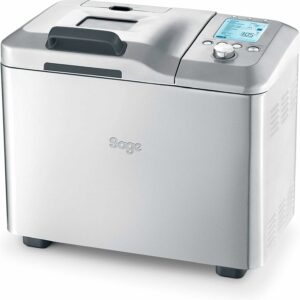 Sage - The Custom Loaf - Bread Maker, Brushed Stainless Steel
Sage - The Custom Loaf - Bread Maker, Brushed Stainless Steel 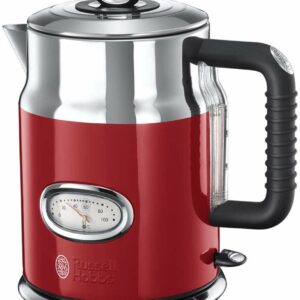 Russell Hobbs Kettle, retro red, 1.7 l, 2400 W, quick cooking function, water temperature display in retro design, filling level marking, optimised pouring spout, vintage 21670-70
Russell Hobbs Kettle, retro red, 1.7 l, 2400 W, quick cooking function, water temperature display in retro design, filling level marking, optimised pouring spout, vintage 21670-70  Sensio Home Personal Blender Smoothie Maker - BPA Free 1L Jar & 600ml Portable Sports Bottle, Electric Blender for Fruit, Vegetables, Protein Shakes, Crush Ice & Frozen Fruit, 2 Speed + Pulse 350W
Sensio Home Personal Blender Smoothie Maker - BPA Free 1L Jar & 600ml Portable Sports Bottle, Electric Blender for Fruit, Vegetables, Protein Shakes, Crush Ice & Frozen Fruit, 2 Speed + Pulse 350W 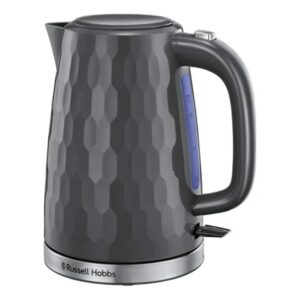 Russell Hobbs Honeycomb Electric 1.7L Cordless Kettle (Fast Boil 3KW, Grey premium plastic, matt & high gloss finish, Removable washable anti-scale filter, Push button lid, Perfect pour spout) 26053
Russell Hobbs Honeycomb Electric 1.7L Cordless Kettle (Fast Boil 3KW, Grey premium plastic, matt & high gloss finish, Removable washable anti-scale filter, Push button lid, Perfect pour spout) 26053  Rolling Kitchen Island Cart with Solid Wood Countertop Spice Rack and Wheels Portable Kitchen Cart (1 Piece)
Rolling Kitchen Island Cart with Solid Wood Countertop Spice Rack and Wheels Portable Kitchen Cart (1 Piece)  150FT Expandable Flexible Garden Hose with 7 Setting Professional Water Spray Nozzle
150FT Expandable Flexible Garden Hose with 7 Setting Professional Water Spray Nozzle 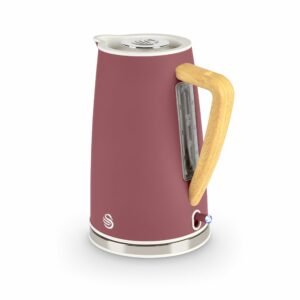 Swan SK14610FUS Nordic Cordless Jug Kettle with Fast Boil Technology, Overheat Protection, Soft Touch Handle, 1.7L, 3KW, Fuchsia Rose, Fusia
Swan SK14610FUS Nordic Cordless Jug Kettle with Fast Boil Technology, Overheat Protection, Soft Touch Handle, 1.7L, 3KW, Fuchsia Rose, Fusia 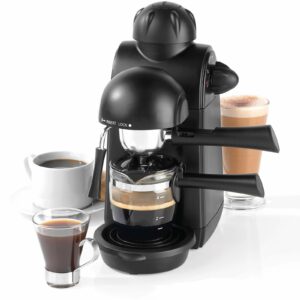 Salter EK3131 Espressimo Coffee Machine – 4-Shot Espresso Maker, Milk Frothing Wand, Includes 240 ml Glass Carafe, Barista Style Latte And Cappuccino, 5-Bar Pressure, Stainless Steel Filter, 870W
Salter EK3131 Espressimo Coffee Machine – 4-Shot Espresso Maker, Milk Frothing Wand, Includes 240 ml Glass Carafe, Barista Style Latte And Cappuccino, 5-Bar Pressure, Stainless Steel Filter, 870W  Revel CCM104 Wet and Dry Grinder, Plastic, White/Green
Revel CCM104 Wet and Dry Grinder, Plastic, White/Green 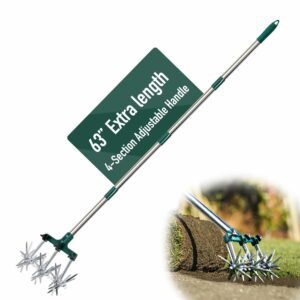 Rotary Cultivator Set, 25"-63" Adjustable Gardening Rotary Tiller and Hand-Held Garden Cultivator Tool with Steel Detachable Tines, Reseeding Grass or Soil Mixing
Rotary Cultivator Set, 25"-63" Adjustable Gardening Rotary Tiller and Hand-Held Garden Cultivator Tool with Steel Detachable Tines, Reseeding Grass or Soil Mixing 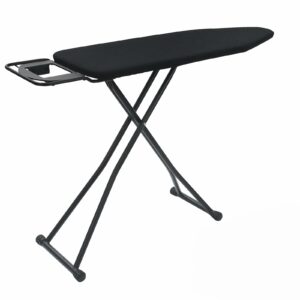 Rainberg 122 x 38cm Folding Ironing Board with Jumbo Iron Rest, Adjustable Height Up To 93cm, Foldable & Collapsible Ironing Table (Black)
Rainberg 122 x 38cm Folding Ironing Board with Jumbo Iron Rest, Adjustable Height Up To 93cm, Foldable & Collapsible Ironing Table (Black)  AOUXIN 3 Piece Rattan Garden Furniture Set, Outdoor Sectional Sofa with Coffee Table, Black Wicker, White Cushions
AOUXIN 3 Piece Rattan Garden Furniture Set, Outdoor Sectional Sofa with Coffee Table, Black Wicker, White Cushions  3 ft. Short Window Pane Shoji Screen - White - 4 Panels
3 ft. Short Window Pane Shoji Screen - White - 4 Panels